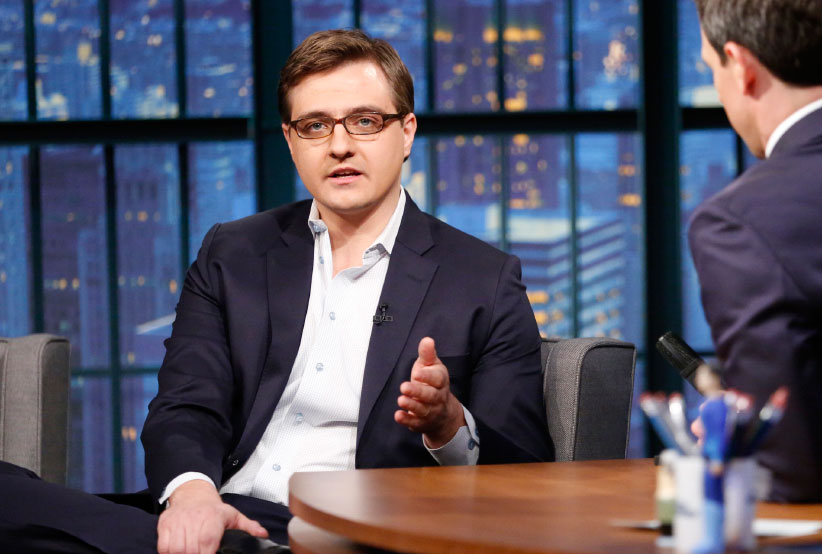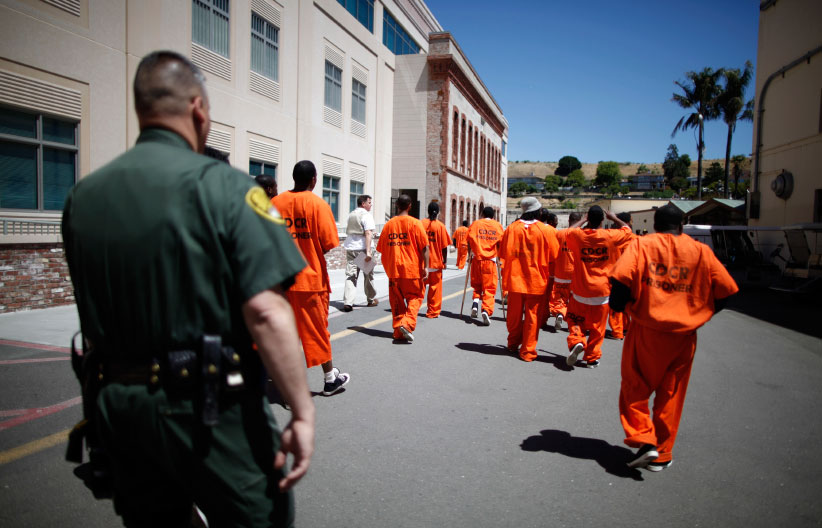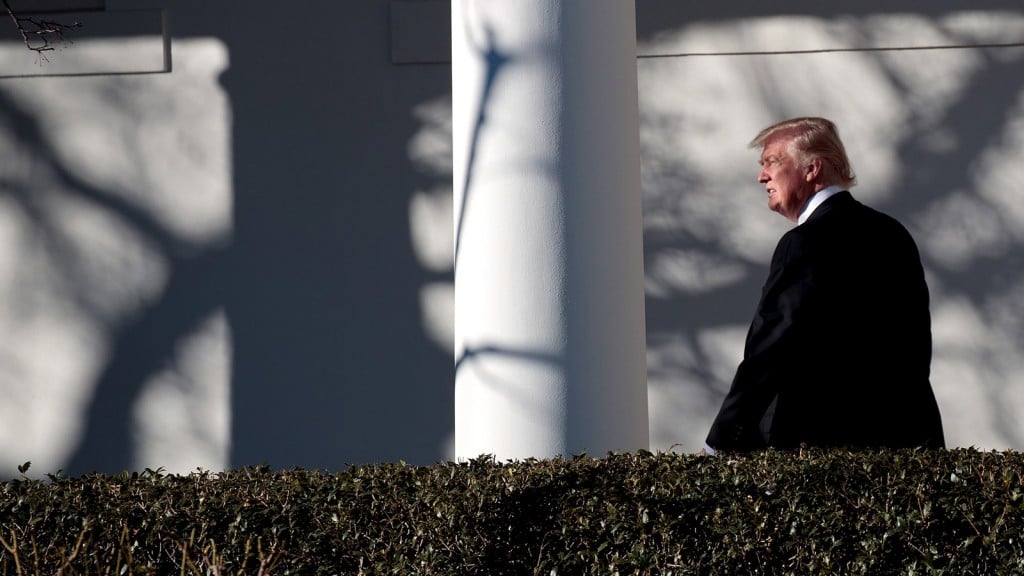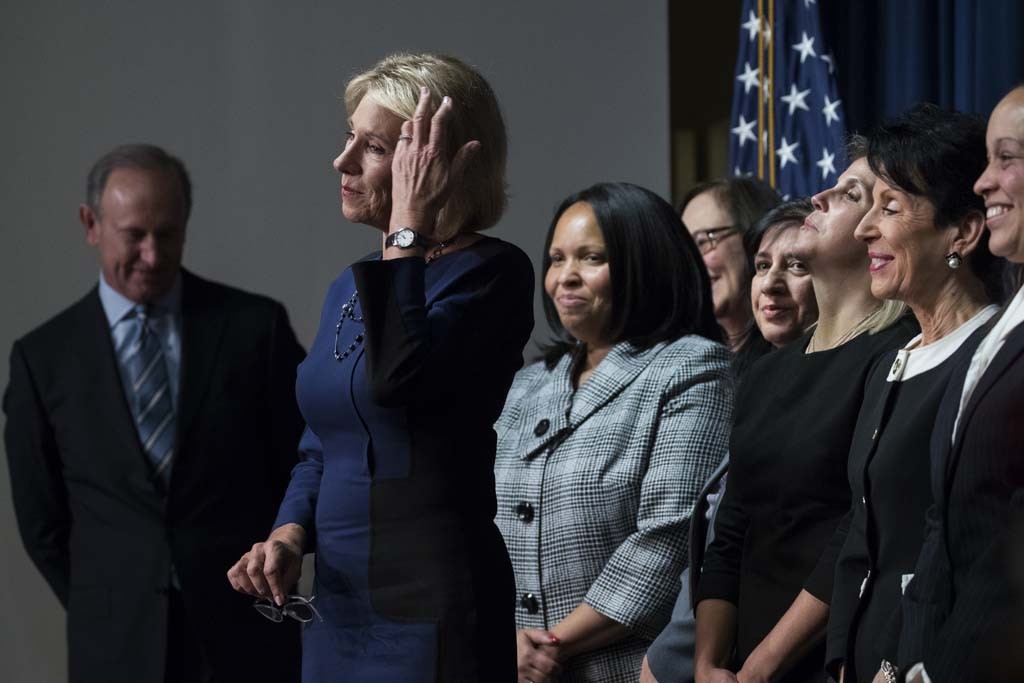Chris Hayes on America’s inherent vice: the prison system
The MSNBC anchor discusses his provocative book on America’s criminal justice system, the politics of fear and order, and Trump as a conspiracy theorist
MSNBCs Chris Hayes during an interview with host Seth Meyers on March 24, 2015. (Lloyd Bishop/NBC/Getty Images)
Share

Chris Hayes is one of American television’s smartest and most prominent liberals, from his 8 o’clock roost at MSNBC’s All In With Chris. His new book, A Colony in a Nation—out March 21—is an important, thought-provoking contribution towards America’s debate over law and order.
“One (the Nation) is the kind of policing regime you’d expect in a democracy; the other (the Colony) is the kind you’d expect in an occupied land,” he writes. “In the Nation, there is law; in the Colony, there is only a concern with order…In the Nation, you have rights; in the Colony, you have commands.”
In his first long interview about his upcoming book, Maclean’s spoke to Hayes from his New York office at 30 Rockefeller Plaza. Conversation ranged from Donald Trump’s belief in deranged conspiracy theories to Betsy DeVos attacking one of America’s last attempts at equity. We also discussed sex crime and mass incarceration, Ferguson, and the FBI. This conversation has been condensed and edited.
Q: Bernie Sanders was persuasive on All In With Chris recently, saying that Donald Trump is a “pathological liar.” Is it credible that Michael Flynn ran rogue with the Russians without Trump’s approval?
A: At this point it’s very hard to take anything said by the White House at face value. That is a pretty big policy item to freelance: the President of the United States has just announced a series of fairly significant sanctions. They’re kicking people out of the country, in real time. They’re rolling out complexes on the Eastern shore and in New York. For the National Security Advisor-designate to freelance a call to the Russian ambassador seems a wild overstepping of bounds. Or a President-elect who does not have control over his own staff. Or it was done at the direction of the President-elect.
Q: You’ve said that you’re distressed by Donald Trump’s conspiracy theories about massive voter fraud.
A: What I find so distressing about this story is that there’s sometimes that assumption that he’s cynically demagoguing issues. Here’s an example of where he’s having a private meeting with senators, there’s no public audience to demagogue. Here’s immediately launching into a completely deranged, deranged conspiracy theory about voters “bussed in.” Think for a second about how preposterous this would be as a logistical possibility. It’s since been denounced as such by the former GOP New Hampshire state chair, the former GOP attorney-general of New Hampshire, basically every Republican Party official from the state of New Hampshire. What’s so disturbing to me is that at a certain point you have to take him at his word that he believes the things he’s saying. That he is the kind of individual who could come to believe truly insane, deranged and delusional things, in contradiction of every last bit of fact, evidence and common sense.
It’s not that surprising when you look at what he was saying about Obama’s birth certificate. There’s one way of looking at the Birther crusade as a transparently cynical and racist campaign to elevate his political profile by this cheap, cynical, lowest-common-denominator stunt. The more disturbing idea would be that he believed it: that a massive conspiracy had been pulled off in front of everyone’s eyes. I find the notion that the most powerful person in the world lacks the basic critical thinking abilities to separate out deluded nonsense from a plausible description of the world is just terrifying.
Q: Trump’s praise of Alex Jones, who believes the Sandy Hook massacre was a hoax, terrifies me, too. Such deranged conspiracy theories are Jones’s Infowars territory.
A: Yes, it’s no accident that there is a nexus between Trump, Roger Stone and Infowars and Alex Jones. It’s very much an Infowars presidency in many ways. The President is a conspiracy theorist. He has reliably touted conspiracy theories. It’s a core part of how he processes the world epistemically. That is deeply, deeply dangerous, and disturbing.
Q: During the end stages of the election, Trump repeated his call that the Central Park Five should be executed, despite their full exoneration, including by DNA evidence. On the campaign trail he repeatedly celebrated the “good old days,” when violence could be meted out against black and brown people with impunity. Is his thinking an extreme of the kind of thinking A Colony in a Nation challenges?
A: Yeah. One of the ways to understand Trump’s views is that he was forged in the fires of New York City racial politics of the 70s, 80s, and 90s. That milieu suffuses everything. It’s not surprising that Rudy Giuliani had such a key role in Trump’s campaign. It turns out that New York City politics of white fear aren’t that hard to export to other parts of the country.

Q: Chapter VI of A Colony in a Nation has a strong opening paragraph: “Americans like to humiliate wrongdoers…We like, in short, to punish. It makes us feel good. By every conceivable metric—arrests, prosecutions, duration of sentences, conditions of imprisonment—the United States is by far the most punitive rich democracy.” Playing devil’s advocate, is it problematic that some progressives supposedly against mass incarceration want to expand the definition of what constitutes a sex crime, relax the state’s burden of proof, and have significantly longer sentences?
A: The devil’s in the details there. Generally the impulse to find justice through punitive measures can be a kind of quicksand. What James Whitman, the scholar I cite in that chapter, talks about as an urge to level down, I think you see that everywhere. We’re going to be a punitive society, so we might as well level out that punitiveness. Bankers and college swim stars and everyone face that same kind of wrath.
I understand that impulse because there is a deep sense of justice in that, particularly when it comes to sex crimes, particularly when we know that the nature of patriarchy, gender inequality and rape culture is manifested through violence against women that goes unpunished. The desire to punish is a desire that emanates from a place of equality and justice. The lesson I feel that we have to confront is that that impulse is so easily transmuted into something corrosive and corrupt in how it’s actually put into practice. That’s the danger. It’s not that the impulse is wrong or unjust or not totally righteous. It’s that the ways in which the system that operates, the system that we’ve constructed tends to not deliver the promise of equity we might want, when we look to the system to provide it.
Q: Agreed. Your take on drug law enforcement, citing the central Harlem model versus universities like Harvard, is a great, incisive example of the Colony versus the Nation.
A: We have different expectations for different groups of people. We tend to modulate the degree with which we’re forgiving or punitive depending on how well we know folks, or how much we consider them peers, or how much social capital we’ve invested in them. That has to do with race, class, gender, and socioeconomic status. We have a tendency to bend over backwards to forgive folks we think of as part of “the us.” The question of who we define as “the us” is a lot of what constitutes how we punish who we punish.
Q: One in three black men end up incarcerated in an America prison. Though black Americans make up 6.5 per cent of the population, they represent 40.2 per cent of the prison population. More black men are currently in jail than were slaves in 1865. Though policies improved under Obama, do these stats show a bipartisan problem?
A: One of the points I make in the book is that the paradox of the American justice system is it’s not one system, it’s literally thousands of systems. Counties, municipalities, states, federal government, interlocking criminal legal codes. Tens of thousands, if not millions, of individual actors. Police making individual choices on the street of who to stop or who to arrest. Prosecutors deciding who to charge, and what plea bargains to offer at what level. State legislators deciding what to criminalize and what not to criminalize. The issue is so much broader than any one party, or any area of the country, or any one policy, because the totality of it is that it’s driven by the underlying politics. The underlying politics are white fear and wrath and punishment. And that’s what tends to be consistent. As I say in the book, that’s the magnet that’s drawing the iron filings into alignment. That’s the thing that’s powering all of it. The gravitational pole of those politics operate on each of these disparate little actors.
Q: Private prison stocks shot up on Donald Trump’s election.
A: That probably had more than anything to do with immigration detention. Immigration detention is a huge growing market for private prisons, that is almost entirely privatized. Should he continue along the path he’s started with the executive order it’s not an irrational belief that they will see more profits.
Q: Trump has threatened to “send in the feds” to Chicago. Will he and his team will employ a hardcore “Colony” approach to law and order?
A: The executive order they’ve already signed signals that. Donald Trump’s campaign rhetoric is almost literally describing parts of America that are predominantly black and poor as another country, like a war zone—you walk down the street, you get shot. Painting it in almost the most foreign, colonial terminology possible. That’s clearly their framework to approach these parts of America. Donald Trump fundamentally views these areas as foreign in some deep way. His response is to interact with them as an American president might react to a violent, recalcitrant, rebellious, or foreign land—which is to send in the troops.

Q: “Historians will spend the next century analyzing how a country with such allegedly grand democratic traditions was, so swiftly and so easily, brought to the brink of fascism. But one needn’t stretch too far to conclude that an eight-year campaign of consistent and open racism aimed at the leader of the free world helped clear the way,” Ta-Nehisi Coates wrote.
A: Yeah. That Ta-Nehisi piece captured a lot and forced me to think. The central question for American politics right now is how did the country that elected Barack Obama elect Donald Trump. There’s a lot to what Ta-Nehisi says about the racial reaction and backlash. And the power and the force and ultimately the success. The man who was selling this racist conspiracy theory about the first black President’s birth: that’s what launched him into a political career that ended up getting him elected the President of the United States. That is an absolutely remarkable fact.
Q: Is Donald Trump a fascist?
A: What I think is clear is that his deepest instincts as a person are authoritarian. The way he think about institutions, the way he think about citizens and minorities and the press, are fundamentally and instinctually opposed to the basic precepts of liberal democracy. His instincts are the instincts of the strong fist.
Q: “By 2015, fines and fees would make up more than one-fifth of the city of Ferguson’s total revenue,” you write. Ideological opposition to tax has negative externalities.
A: If you read the DOJ report on Ferguson, what’s clear is the Ferguson Police Department was primarily designed as a revenue source. Quite explicitly. They talk about priming the revenue pipeline. They talk about new initiatives to produce revenue. You have a police force that’s been entirely corrupted and distorted not by an emphasis on public safety, which is what police forces should be looking for, but producing revenue. That’s partly so Ferguson can keep taxes low. Garnishing revenue from citizens that have the least amount of power. Ferguson, St. Louis, and the towns around are not alone. In America, increasingly, fines and fees make up bigger shares of budgets, because of the reticence to raise taxes. There are a lot of towns around America that increasingly function in the same way.
Q: There was questionable activity from the FBI in the lead-up to the election.
A: It’s something that we’ve covered a huge amount on the show. There’s an Inspector-General investigation into the FBI. There’s an amazing batch of reporting out from The Intercept about the FBI. There are real concerns about how the FBI, particularly internally, conducted itself during the campaign. Particularly the reporting that indicates there were very pro-Trump forces within the FBI who were essentially leaking. It was out of concern with those leaks that James Comey wrote that infamous letter, that polling indicates was an extremely strong factor in Trump’s victory, if not the decisive factor. I think there’s a lot more we need to learn about what’s going on with the FBI.
Q: Your previous book, Twilight of the Elites, was prescient about the potential conditions for demagoguery in America.
A: The book’s main thesis has been borne out far past what I could ever have imagined. The major idea was that these series of elite failures created this crisis of authority which was fertilizing distrust in the pillars and institutions of American society. In the absence of that authority there’s this vacuum which is easily filled by authoritarian solutions, and I think that’s exactly what happened.

Q: You and I are both the sons of excellent public school teachers. It’s distressing to see Betsy DeVos’s ignorant attack on America’s public schools, one of America’s last attempts at equity.
A: DeVos’ worldview and educational philosophy is out of the mainstream. There’s this desire to rip apart the last bastion of civic core in America, which is American public education. She’s been fairly forward in her desire to do that. Her results in Detroit are not particularly promising.
Q: Steve Bannon said journalists “should shut up”. Omarosa boasted about “dirt dossiers” on reporters. Kellyanne Conway advocated that all the journalists who criticized Trump be fired, while arguing for “alternative facts.” What’s your message to these Republican press critics?
A: Every member of the press, every journalist, should just do their jobs. People in power whine about the press all the time, it’s not new. The tone these people take is more authoritarian.
Q: “Powers of our president”, Stephen Miller said Sunday, referring to judges blocking Trump’s immigration executive order. “Will not be questioned.” What’s your response?
A: America is a liberal democracy. People can question whatever they want, whatever Stephen Miller says.
Q: What might surprise readers about A Colony In a Nation?
A: The degree to which I try to be honest that there’s some Donald Trump in all of us. The seduction of the promise of order, the politics of white fear, it’s not just some other group of uneducated white people who are susceptible to those appeals. It’s everyone. And not just white people, frankly. All Americans have this susceptibility to a politics of fear and order that I think we have to be really honest about.
Q: Despite its many admirable liberals, New York has the most segregated schools in America.
A: Exactly, that’s the perfect example of what I’m talking about.
Alexander Bisley’s recent interviews include Garry Kasparov and Paul Auster.